![[gg]_Mawaru_Penguindrum_-_24_[E51B0C58].mkv_snapshot_00.49_[2011.12.22_23.31.39] [gg]_Mawaru_Penguindrum_-_24_[E51B0C58].mkv_snapshot_00.49_[2011.12.22_23.31.39]](https://lh6.ggpht.com/-h7yY40QDGVQ/TvRDobrcr9I/AAAAAAAAmEU/jrtGK4rMNp0/Image.jpg?imgmax=800) |
![[gg]_Mawaru_Penguindrum_-_24_[E51B0C58].mkv_snapshot_05.34_[2011.12.22_23.36.44] [gg]_Mawaru_Penguindrum_-_24_[E51B0C58].mkv_snapshot_05.34_[2011.12.22_23.36.44]](https://lh5.ggpht.com/-5PeKaKt3uBQ/TvRDpsHKXPI/AAAAAAAAmEk/dEkbZKeruTo/Image.jpg?imgmax=800) |
![[gg]_Mawaru_Penguindrum_-_24_[E51B0C58].mkv_snapshot_12.54_[2011.12.22_23.44.02] [gg]_Mawaru_Penguindrum_-_24_[E51B0C58].mkv_snapshot_12.54_[2011.12.22_23.44.02]](https://lh3.ggpht.com/-t9qa48P-yw0/TvRDq2tfDmI/AAAAAAAAmE0/n9yqCcDv3BQ/Image.jpg?imgmax=800) |
![[gg]_Mawaru_Penguindrum_-_24_[E51B0C58].mkv_snapshot_19.01_[2011.12.22_23.51.22] [gg]_Mawaru_Penguindrum_-_24_[E51B0C58].mkv_snapshot_19.01_[2011.12.22_23.51.22]](https://lh6.ggpht.com/-WjgEgxm_68U/TvRDsRt8kRI/AAAAAAAAmFE/7fyeTBRJqdE/Image.jpg?imgmax=800) |
![[gg]_Mawaru_Penguindrum_-_24_[E51B0C58].mkv_snapshot_21.00_[2011.12.22_23.53.20] [gg]_Mawaru_Penguindrum_-_24_[E51B0C58].mkv_snapshot_21.00_[2011.12.22_23.53.20]](https://lh6.ggpht.com/-zzwdTtOLr4o/TvRDuPl54dI/AAAAAAAAmFU/q_PmV3IUcV4/Image.jpg?imgmax=800) |
![[gg]_Mawaru_Penguindrum_-_24_[E51B0C58].mkv_snapshot_22.41_[2011.12.22_23.55.29] [gg]_Mawaru_Penguindrum_-_24_[E51B0C58].mkv_snapshot_22.41_[2011.12.22_23.55.29]](https://lh3.ggpht.com/-T3aPUdsGQT8/TvRDvIyKvNI/AAAAAAAAmFk/weKeCxtfTlM/Image.jpg?imgmax=800) |
I almost feel lost even trying to begin this post, because there’s so much happening both intellectually and emotionally that I’m trying to sort out. No other series this season has been able to do that to me, for better or worse.
In the end, it seems that Kanba and Shouma shared the same fate – indeed, that fate was sealed when they shared the apple. They’re Superfrog – they are the scorpion who died so his body would bring light to the darkness. Most of all, they’re Campanella and Giovanni, reunited in the end. The symbolism that was so elusive and mysterious for much of the series was almost shockingly literal at the last, perhaps a small token of gratitude from Ikuhara to his audience for sticking with him through all the meanders in this river. What remains unclear to me, though, is why Shouma and Kanba had this fate thrust upon them. Indeed, in the end, I think Ikuhara has painted us a picture of a fairly nihilistic universe that’s devoid of justice – though at the least, not of hope and kindness. In point of fact, I think it should be pointed out that this is very much the sort of universe Kenji depicts on Night in the Galactic Railroad.
The conventional approach to situations like this is to ask, “Did I like the ending?” but to be honest the question feels shallow and pointless to me. I can react to it viscerally – it moved me deeply, but didn’t leave me feeling satisfied. I can tackle it intellectually – it was fascinating, and I’m going to be up late thinking about what it all means. But in the final analysis, I can only think what I think and feel what I feel. Somehow, this has left me empty. Giovanni and Campanella shouldn’t both be dead – it feels wrong to me. It seems off that Shouma should have to share the same fate as Kanba, despite the way they lived their lives so differently. It seems off that the two of them should have to accept this punishment for an action taken when they were children, and never really explained in context. Maybe I really was hoping for justice from Ikuhara, though I knew that to be a foolish hope. I certainly didn’t expect everyone to come out of this alive, but I didn’t expect everyone in the story to have a happy ending except Shouma and Kanba. I feel as if somehow Ikuhara has drawn an equivalency between them that I don’t think exists. But then, they’re his characters so by definition he’s right and I’m wrong.
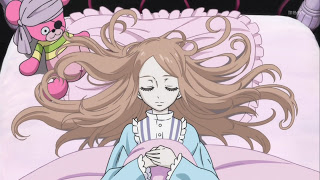 This ending is not without its redemptive qualities, that I won’t deny. But in “Night” it’s ultimately Giovanni’s resolve to live and to seize the opportunity to help others that’s the lesson of Campanella’s sacrifice – really, this is as if the story had ended with Giovanni walking home from the river and throwing himself in front of a carriage to save another boy, and dying in the process. It’s feels wrong to have Ringo and Shouma torn apart, though his sacrifice was certainly noble. As I read the situation, Kanba and Shouma’s fate was sealed when they ate of the apple (where did the apple come from? Himari?) Shouma sacrificed himself to save Ringo, and Kanba to save Himari – but Shouma, in a sense, also gave his life for Kanba, as he returned the apple – the life force – that Kanba had given him when they were children in the box. So Shouma tells Ringo he loves her, but he dies, leaving her alone – apart from Himari, in any case. It really appears as if instead of Giovanni and Campanella, we have two Campanellas. Except that one of them lived his life selfishly and took the lives of others, though his fate was the same as the one who lived his life selflessly.
This ending is not without its redemptive qualities, that I won’t deny. But in “Night” it’s ultimately Giovanni’s resolve to live and to seize the opportunity to help others that’s the lesson of Campanella’s sacrifice – really, this is as if the story had ended with Giovanni walking home from the river and throwing himself in front of a carriage to save another boy, and dying in the process. It’s feels wrong to have Ringo and Shouma torn apart, though his sacrifice was certainly noble. As I read the situation, Kanba and Shouma’s fate was sealed when they ate of the apple (where did the apple come from? Himari?) Shouma sacrificed himself to save Ringo, and Kanba to save Himari – but Shouma, in a sense, also gave his life for Kanba, as he returned the apple – the life force – that Kanba had given him when they were children in the box. So Shouma tells Ringo he loves her, but he dies, leaving her alone – apart from Himari, in any case. It really appears as if instead of Giovanni and Campanella, we have two Campanellas. Except that one of them lived his life selfishly and took the lives of others, though his fate was the same as the one who lived his life selflessly.
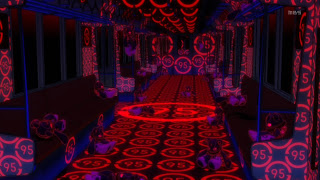 At the very least, Penguin #3 made sure Himari was aware of her brothers’ existence on some level – though how much of a kindness that is, I’m honestly not sure. And Sanetoshi’s worldview was soundly rejected, as Momoka trumped him once more by somehow getting a message to Ringo with the true phrase needed to transfer fate. Where Sanetoshi may have been right that there was no justice, he was wrong in thinking that all mortal life was ultimately futile, and that no matter what we do we’ll never escape our boxes. Yuri and Tabuki did, and in their way so did Masako and Mario. Himari and Ringo live on as a sort of blessed existence, reborn out of an act of sacrifice and left in their own way to fill the Giovanni role, except that they don’t even really know that Campanella ever existed. That, in its way, is one of the saddest elements of the ending for me.
At the very least, Penguin #3 made sure Himari was aware of her brothers’ existence on some level – though how much of a kindness that is, I’m honestly not sure. And Sanetoshi’s worldview was soundly rejected, as Momoka trumped him once more by somehow getting a message to Ringo with the true phrase needed to transfer fate. Where Sanetoshi may have been right that there was no justice, he was wrong in thinking that all mortal life was ultimately futile, and that no matter what we do we’ll never escape our boxes. Yuri and Tabuki did, and in their way so did Masako and Mario. Himari and Ringo live on as a sort of blessed existence, reborn out of an act of sacrifice and left in their own way to fill the Giovanni role, except that they don’t even really know that Campanella ever existed. That, in its way, is one of the saddest elements of the ending for me.
Ultimately, it all comes down to how you view Kanba and Shouma’s fate, I suppose. You might make the case that for all his sins, Kanba was redeemed for the act of kindness in sharing the apple with Shouma all those years earlier. Perhaps the “reward” they were given as children who died for love is some sort of Christian redemption, as espoused by the tutor in “Night”. Perhaps they’ve been exempted from the perpetual cycle of rebirth and been allowed to advance to the next stage of existence, and that death truly is “where everything begins”. Or perhaps their reward is simply that they’re to be together again, whether in the purgatory of the galactic railroad or in another mortal incarnation. This is Ikuhara, so I suppose the ending is whatever it is you take away from it – and that’s largely a measure of what you brought in the first place.
![[gg]_Mawaru_Penguindrum_-_24_[E51B0C58].mkv_snapshot_06.22_[2011.12.22_23.37.28] [gg]_Mawaru_Penguindrum_-_24_[E51B0C58].mkv_snapshot_06.22_[2011.12.22_23.37.28]](https://lh4.ggpht.com/-89ElQnuy-F0/TvRDwssRMLI/AAAAAAAAmF0/LCOCkpzUvS4/Image.jpg?imgmax=800) |
![[gg]_Mawaru_Penguindrum_-_24_[E51B0C58].mkv_snapshot_07.32_[2011.12.22_23.38.39] [gg]_Mawaru_Penguindrum_-_24_[E51B0C58].mkv_snapshot_07.32_[2011.12.22_23.38.39]](https://lh6.ggpht.com/-paP7Nb20HcM/TvRDxpsLzUI/AAAAAAAAmGE/Vz-7m0k2w18/Image.jpg?imgmax=800) |
![[gg]_Mawaru_Penguindrum_-_24_[E51B0C58].mkv_snapshot_08.39_[2011.12.22_23.39.46] [gg]_Mawaru_Penguindrum_-_24_[E51B0C58].mkv_snapshot_08.39_[2011.12.22_23.39.46]](https://lh4.ggpht.com/-MbV6FyxPcd8/TvRDzU8OZQI/AAAAAAAAmGU/5R78MW1Zd4c/Image.jpg?imgmax=800) |
![[gg]_Mawaru_Penguindrum_-_24_[E51B0C58].mkv_snapshot_09.12_[2011.12.22_23.40.20] [gg]_Mawaru_Penguindrum_-_24_[E51B0C58].mkv_snapshot_09.12_[2011.12.22_23.40.20]](https://lh6.ggpht.com/-6qb1te9DYHU/TvRD0j2_lAI/AAAAAAAAmGk/qC6LZHESp_s/Image.jpg?imgmax=800) |
![[gg]_Mawaru_Penguindrum_-_24_[E51B0C58].mkv_snapshot_10.35_[2011.12.22_23.41.43] [gg]_Mawaru_Penguindrum_-_24_[E51B0C58].mkv_snapshot_10.35_[2011.12.22_23.41.43]](https://lh3.ggpht.com/-Aw0DnTs-wwU/TvRD1hNA7SI/AAAAAAAAmG0/7JHyUgZ5f7Q/Image.jpg?imgmax=800) |
![[gg]_Mawaru_Penguindrum_-_24_[E51B0C58].mkv_snapshot_11.31_[2011.12.22_23.42.38] [gg]_Mawaru_Penguindrum_-_24_[E51B0C58].mkv_snapshot_11.31_[2011.12.22_23.42.38]](https://lh3.ggpht.com/-iK3pRPormbM/TvRD2t90i3I/AAAAAAAAmHA/MpQu7MJIQk8/Image.jpg?imgmax=800) |
![[gg]_Mawaru_Penguindrum_-_24_[E51B0C58].mkv_snapshot_13.14_[2011.12.22_23.44.22] [gg]_Mawaru_Penguindrum_-_24_[E51B0C58].mkv_snapshot_13.14_[2011.12.22_23.44.22]](https://lh3.ggpht.com/-42J5L_ekZUA/TvRD4OfOeMI/AAAAAAAAmHU/DUznba1jJb8/Image.jpg?imgmax=800) |
![[gg]_Mawaru_Penguindrum_-_24_[E51B0C58].mkv_snapshot_13.53_[2011.12.22_23.45.11] [gg]_Mawaru_Penguindrum_-_24_[E51B0C58].mkv_snapshot_13.53_[2011.12.22_23.45.11]](https://lh3.ggpht.com/--wIC7-9hqoY/TvRD5SvZVDI/AAAAAAAAmHk/4uuKKJEC8cw/Image.jpg?imgmax=800) |
![[gg]_Mawaru_Penguindrum_-_24_[E51B0C58].mkv_snapshot_14.38_[2011.12.22_23.45.55] [gg]_Mawaru_Penguindrum_-_24_[E51B0C58].mkv_snapshot_14.38_[2011.12.22_23.45.55]](https://lh3.ggpht.com/-a04olA2nx80/TvRD6JSSS4I/AAAAAAAAmH0/ufY8ff6Hy9A/Image.jpg?imgmax=800) |
![[gg]_Mawaru_Penguindrum_-_24_[E51B0C58].mkv_snapshot_14.55_[2011.12.22_23.46.12] [gg]_Mawaru_Penguindrum_-_24_[E51B0C58].mkv_snapshot_14.55_[2011.12.22_23.46.12]](https://lh3.ggpht.com/-P5W_6Xo4Mos/TvRD7OzCtNI/AAAAAAAAmIE/5eM8FeCCMNM/Image.jpg?imgmax=800) |
![[gg]_Mawaru_Penguindrum_-_24_[E51B0C58].mkv_snapshot_15.00_[2011.12.22_23.46.53] [gg]_Mawaru_Penguindrum_-_24_[E51B0C58].mkv_snapshot_15.00_[2011.12.22_23.46.53]](https://lh6.ggpht.com/-RrO8M79N3gI/TvRD8RjU1II/AAAAAAAAmIU/LkV8EGpqEE4/Image.jpg?imgmax=800) |
![[gg]_Mawaru_Penguindrum_-_24_[E51B0C58].mkv_snapshot_15.19_[2011.12.22_23.47.14] [gg]_Mawaru_Penguindrum_-_24_[E51B0C58].mkv_snapshot_15.19_[2011.12.22_23.47.14]](https://lh3.ggpht.com/-7wHnZcmj13s/TvRD9MGy31I/AAAAAAAAmIk/VK6s6Pu0srE/Image.jpg?imgmax=800) |
![[gg]_Mawaru_Penguindrum_-_24_[E51B0C58].mkv_snapshot_15.33_[2011.12.22_23.47.41] [gg]_Mawaru_Penguindrum_-_24_[E51B0C58].mkv_snapshot_15.33_[2011.12.22_23.47.41]](https://lh5.ggpht.com/-VUTAb1zBocQ/TvRD-Vd_31I/AAAAAAAAmI0/jGmbDB8e3CM/Image.jpg?imgmax=800) |
![[gg]_Mawaru_Penguindrum_-_24_[E51B0C58].mkv_snapshot_16.16_[2011.12.22_23.48.25] [gg]_Mawaru_Penguindrum_-_24_[E51B0C58].mkv_snapshot_16.16_[2011.12.22_23.48.25]](https://lh4.ggpht.com/-jD7r0RNlHFg/TvRD_DbrhFI/AAAAAAAAmJE/ZJDcjVXJ7Kc/Image.jpg?imgmax=800) |
![[gg]_Mawaru_Penguindrum_-_24_[E51B0C58].mkv_snapshot_18.08_[2011.12.22_23.50.18] [gg]_Mawaru_Penguindrum_-_24_[E51B0C58].mkv_snapshot_18.08_[2011.12.22_23.50.18]](https://lh3.ggpht.com/-uLzKukFb8jk/TvREAakFPbI/AAAAAAAAmJU/zv4RL3unUxY/Image.jpg?imgmax=800) |
![[gg]_Mawaru_Penguindrum_-_24_[E51B0C58].mkv_snapshot_18.22_[2011.12.22_23.50.31] [gg]_Mawaru_Penguindrum_-_24_[E51B0C58].mkv_snapshot_18.22_[2011.12.22_23.50.31]](https://lh3.ggpht.com/-ig7GoIAmd14/TvREBcs1t5I/AAAAAAAAmJk/5xB1RDYXVJE/Image.jpg?imgmax=800) |
![[gg]_Mawaru_Penguindrum_-_24_[E51B0C58].mkv_snapshot_18.27_[2011.12.22_23.50.37] [gg]_Mawaru_Penguindrum_-_24_[E51B0C58].mkv_snapshot_18.27_[2011.12.22_23.50.37]](https://lh6.ggpht.com/-UiJI7AIL-tI/TvREClyj9KI/AAAAAAAAmJ0/FIEUrrtcv2g/Image.jpg?imgmax=800) |
![[gg]_Mawaru_Penguindrum_-_24_[E51B0C58].mkv_snapshot_18.30_[2011.12.22_23.50.39] [gg]_Mawaru_Penguindrum_-_24_[E51B0C58].mkv_snapshot_18.30_[2011.12.22_23.50.39]](https://lh5.ggpht.com/-nHpMHRXotHM/TvREDrdiIYI/AAAAAAAAmKE/Y-zR8ZQ3zB4/Image.jpg?imgmax=800) |
![[gg]_Mawaru_Penguindrum_-_24_[E51B0C58].mkv_snapshot_18.57_[2011.12.22_23.51.06] [gg]_Mawaru_Penguindrum_-_24_[E51B0C58].mkv_snapshot_18.57_[2011.12.22_23.51.06]](https://lh5.ggpht.com/-zFqeumkAe_w/TvREEyRh3YI/AAAAAAAAmKU/LbxFDuqnQDg/Image.jpg?imgmax=800) |
![[gg]_Mawaru_Penguindrum_-_24_[E51B0C58].mkv_snapshot_19.33_[2011.12.22_23.51.53] [gg]_Mawaru_Penguindrum_-_24_[E51B0C58].mkv_snapshot_19.33_[2011.12.22_23.51.53]](https://lh6.ggpht.com/-tsAlXFNjUVU/TvREF27O_RI/AAAAAAAAmKk/AmeAAlBvesg/Image.jpg?imgmax=800) |
![[gg]_Mawaru_Penguindrum_-_24_[E51B0C58].mkv_snapshot_19.55_[2011.12.22_23.52.15] [gg]_Mawaru_Penguindrum_-_24_[E51B0C58].mkv_snapshot_19.55_[2011.12.22_23.52.15]](https://lh6.ggpht.com/-l38iv6hvgEM/TvREGz0O1MI/AAAAAAAAmK0/t8TOBWImsEs/Image.jpg?imgmax=800) |
![[gg]_Mawaru_Penguindrum_-_24_[E51B0C58].mkv_snapshot_19.55_[2011.12.22_23.52.18] [gg]_Mawaru_Penguindrum_-_24_[E51B0C58].mkv_snapshot_19.55_[2011.12.22_23.52.18]](https://lh6.ggpht.com/-g_Q1GQws0JY/TvREISKwlTI/AAAAAAAAmLE/bvERipsB9mw/Image.jpg?imgmax=800) |
![[gg]_Mawaru_Penguindrum_-_24_[E51B0C58].mkv_snapshot_21.27_[2011.12.22_23.53.47] [gg]_Mawaru_Penguindrum_-_24_[E51B0C58].mkv_snapshot_21.27_[2011.12.22_23.53.47]](https://lh4.ggpht.com/-HmN4_BqLSh8/TvREJnv5zmI/AAAAAAAAmLU/C2Dfus1D08A/Image.jpg?imgmax=800) |
![[gg]_Mawaru_Penguindrum_-_24_[E51B0C58].mkv_snapshot_21.44_[2011.12.22_23.54.04] [gg]_Mawaru_Penguindrum_-_24_[E51B0C58].mkv_snapshot_21.44_[2011.12.22_23.54.04]](https://lh5.ggpht.com/-Rwb0cNuSTXk/TvREKdWPgMI/AAAAAAAAmLk/-EjvAAouLv4/Image.jpg?imgmax=800) |
![[gg]_Mawaru_Penguindrum_-_24_[E51B0C58].mkv_snapshot_21.55_[2011.12.22_23.54.15] [gg]_Mawaru_Penguindrum_-_24_[E51B0C58].mkv_snapshot_21.55_[2011.12.22_23.54.15]](https://lh6.ggpht.com/-74hULJkXjFk/TvREL5iyyUI/AAAAAAAAmL0/wzxLYUhpCfw/Image.jpg?imgmax=800) |
![[gg]_Mawaru_Penguindrum_-_24_[E51B0C58].mkv_snapshot_22.15_[2011.12.22_23.55.03] [gg]_Mawaru_Penguindrum_-_24_[E51B0C58].mkv_snapshot_22.15_[2011.12.22_23.55.03]](https://lh4.ggpht.com/-WM9a7N-F4n0/TvREMhw5dwI/AAAAAAAAmME/UfhxAUkld9I/Image.jpg?imgmax=800) |
![[gg]_Mawaru_Penguindrum_-_24_[E51B0C58].mkv_snapshot_22.21_[2011.12.22_23.54.41] [gg]_Mawaru_Penguindrum_-_24_[E51B0C58].mkv_snapshot_22.21_[2011.12.22_23.54.41]](https://lh6.ggpht.com/-zI4BHQ0XMr4/TvREN49OIXI/AAAAAAAAmMU/_qwad-c39T8/Image.jpg?imgmax=800) |
![[gg]_Mawaru_Penguindrum_-_24_[E51B0C58].mkv_snapshot_22.48_[2011.12.22_23.55.35] [gg]_Mawaru_Penguindrum_-_24_[E51B0C58].mkv_snapshot_22.48_[2011.12.22_23.55.35]](https://lh5.ggpht.com/-ZXJlszSdHbA/TvREPHXA_jI/AAAAAAAAmMk/jssVry2zA3U/Image.jpg?imgmax=800) |
![[gg]_Mawaru_Penguindrum_-_24_[E51B0C58].mkv_snapshot_23.28_[2011.12.22_23.56.22] [gg]_Mawaru_Penguindrum_-_24_[E51B0C58].mkv_snapshot_23.28_[2011.12.22_23.56.22]](https://lh6.ggpht.com/-zhr_9vRVAW4/TvREQmZv5VI/AAAAAAAAmM0/pprxGcHqyKI/Image.jpg?imgmax=800) |
![[gg]_Mawaru_Penguindrum_-_24_[E51B0C58].mkv_snapshot_23.31_[2011.12.22_23.56.25] [gg]_Mawaru_Penguindrum_-_24_[E51B0C58].mkv_snapshot_23.31_[2011.12.22_23.56.25]](https://lh3.ggpht.com/-CFk-trnCjOI/TvRER8LjQCI/AAAAAAAAmNE/NavkuP1l2gw/Image.jpg?imgmax=800) |



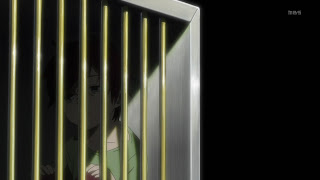
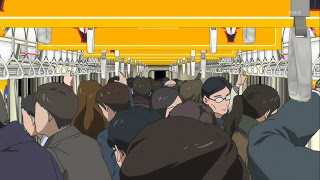
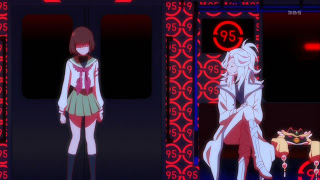


Seishun Otoko
December 23, 2011 at 10:17 amAgreed, empty is probably the best way to describe how I feel after seeing the finale. I didn't think Ikuhara would attempt to provide us many answers, but I can't say this kind of surrealism that was presented at the ending was very satisfactory either.
Having that said, MPD was definitely a fun ride and it was a visual feast if nothing else.
admin
December 23, 2011 at 10:36 amNeither as bad as I feared or as good as I hoped, I suppose. It's Ikuhara's story, but somehow the ending just feels "off" to me. Ultimately, I guess I'm just not buying what he's selling.
Fencedude
December 23, 2011 at 10:38 amI find myself…apathetic. The ending…exists. It doesn't make much sense, and I don't really feel the desire to want to make sense out of it.
This was a very interesting show to watch, but never particularly resonated with me.
I felt more satisfaction the first time I watched Utena.
Anonymous
December 23, 2011 at 1:39 pmThe man who wrote Melancholy of Haruhi Suzumiya should have been on board for this show, seeing as he can write but all this dimensional and time travel kind of stories well.
The only think I understood was what was on face value. The sacrifices and Shouma and Kanba being reborn but with no one knowing they exist.
No idea what Survival Strategy was, nor why Shouma had the same fate when he gave back his half of the apple to Kanba.
The deeper meaning to me felt like it is wrong to cheat death and not give up hope (the apple), which is pretty messed up.
Instead of discussing the end we should discuss how Ikuhara should have made it so we less artistic minds can understand. Eh?
Anonymous
December 23, 2011 at 4:16 pm…… little shouma and kanba conversation at the end about apple just seems so familiar……..little kids from episode 1?
Murkel
December 23, 2011 at 7:47 pmIn my case, I watched episodes 23 and 24 back to back and they left me (obviously) confused but most of all: really tired. I think it's the first time an anime ending has managed to make me feel almost exhausted.
admin
December 23, 2011 at 11:11 pmI feel that, Murkel – this can indeed be a tiring show to watch.
Karmafan
December 24, 2011 at 1:19 amI hate when animes end with everyone screwed over and no one happy. Everyone lost out. The boys lost their lives and the 2 girls lost the ones they loved. I was expecting Kanba to maybe buy the farm or sacrifice himself to save Himari (a life for a life) but both guys gone and the 2 girls alone is just really depressing.
The fact that this bittersweet negative ending comes out at Christmas only makes this last episode that much more unsatisfying.
momogoldfish
December 24, 2011 at 11:02 pmI am surprised at how little discussion there is concerning the very OBVIOUS Christian theme of Original Sin in the show, where all humanity is living and dying as we are now due to the sin (eating the apple) of mankind's first parents Adam and Eve.
Also, if you go by the Milton's version, Adam wasn't tricked by Eve to eat the fruit, he resolved to eat it (and accept death) because he loved Eve and can't bear her suffering alone. Which is why the apple is "the prize for people who choose to die for the one they love".
Going with this, Kanba is Adam who chose to accept the Apple for Himari (a surprisingly virginal Eve) and commit sin for her. Sanetoshi (though a villain) is the God figure with control over life and death who attempts to break everyone from their boxes (return them to Innocence – since it was realization of their individuality that made Adam and Eve first understand shame). Also then Shouma is a depowered Jesus figure who can only perform miracles and save people by offering himself as sacrifice, taking on Kanba's (Adam's) sin. Ringo then is probably Mary Magdelene, the reformed prostitute. Then after judgement day, both Adam and Shouma were 'reborn', with the old sins cleansed.
However I'm still wondering what role Momoka plays in a Christian analogy angle. Is she the other half of Jesus Christ, the travelling miracle performer whose ultimately sacrifice ended up unsuccessful? Is she as Princess of the Crystal the Serpent, who urge people to obtain the Penguindrum (an apple)? Or is she the merciful Holy Virgin Mary, to complete the three most important female figures in Christianity?
Rather than a Christmas series, I'd say this makes a better Easter series (if there is such a thing)
Anonymous
December 26, 2011 at 11:55 amJust had a realization when reading what you wrote about Momoka foiling Sanetoshi's plan once again by delivering the phrase to Ringo, it's irony at work.
Sanetoshi sent Double-H the scarves, and that was what triggered them delivering the song and gift to Himari in person which ended up tipping off Ringo.
The world works in a roundabout way.